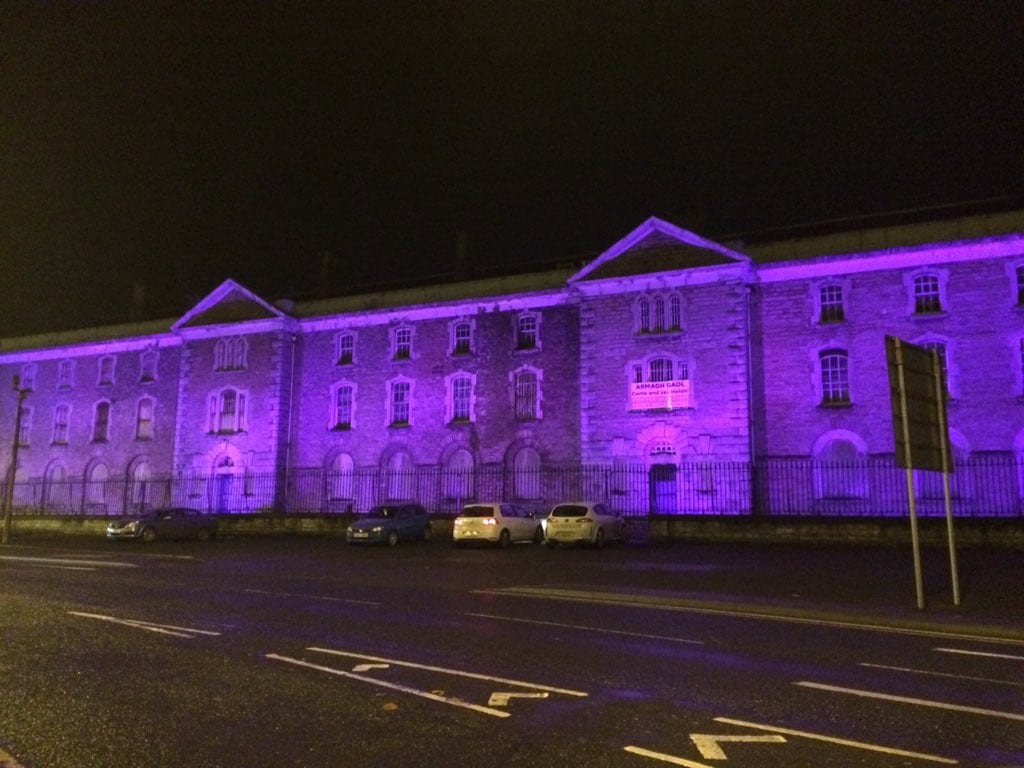
A “major breakthrough” in the fight against pancreatic cancer is being reported by scientists at the Ulster University today (Tuesday).
Friday marked World Pancreatic Cancer Awareness Day and the Gaol in Armagh was lit up in purple – the internationally-recognised colour associated with the condition – to bring awareness.
Armagh woman Grainne O’Neill, who lost her mum and set up the ‘Fight on for Annie’ website, has been campaigning to raise awareness and to educate others on pancreatic cancer.
The 23-year-old has been on a mission to raise awareness of a disease that has just a one year relative survival rate out of 20 per cent.
She has undertaken various events to raise money to fund research through charities such as Pancreatic Cancer UK.
Grainne, with the support of sister Sinead, brother Fergal and father Tom, organised the charity’s first ever ‘Fight on for Annie Purple Gala Ball’ which was held at Belfast’s Europa Hotel in Belfast last month.
The night saw a total of £14,000 raised, bringing the fundraising total to date up to £37,000.Money being raised by Grainne and others like-minded has been helping to fund research in the hope of fighting back.
And now today, the team at Ulster University have announced this major breakthrough in the global fight against pancreatic cancer, the fourth most common cause of cancer-related deaths globally.
The work, led by researchers at the university, has revealed the potential of a new, minimally invasive treatment, activated by harmless sound waves, also known as ultrasound.
According to the Ulster University, initial tests on the most common type of pancreatic tumour called Pancreatic Ductal Adenocarcinoma (PDAC), undertaken at Ulster University’s Biomedical Sciences Research Institute in Coleraine, have shown a five-fold reduction in tumour size, making it potentially one of the most significant breakthroughs in the treatment of pancreatic cancer in recent years.
Of the top 21 most common types of cancer in the UK, pancreatic has the lowest survival rate – with just four per cent of patients surviving five years or more.
This devastating statistic has not changed in more than four decades and more than 200,000 people around the world die from pancreatic cancer ever year.
In developing this technology, Ulster University Professors John Callan and Tony McHale have teamed up with University of Oxford’s Professor Eleanor Stride and one of Northern Ireland’s top pancreatic cancer surgeons, Mr Mark Taylor, to produce the minimally invasive treatment that has the potential to significantly improve the outcome for pancreatic cancer patients.
Ulster University’s Norbrook Chair of Pharmaceutical Science, Professor John Callan, explained: “In what is a highly novel and targeted technique, our team has developed tiny oxygen filled microbubbles which have a non-active drug attached to the surface.
“After the microbubbles have been delivered by injection, they are purposely burst in the tumour using harmless sound waves, releasing the oxygen and non-active drug. These sound waves also activate the drug, a treatment known as sonodynamic therapy (SDT), making it kill the tumour cells.
“Because we can control exactly where the sound waves go, we can selectively target the tumour and spare healthy tissue making this a highly targeted therapy with reduced side-effects. This really is a groundbreaking development and one of the most promising advances in pancreatic cancer research for decades.”
In addition to the targeted delivery and treatment potential offered by the approach, the delivery of oxygen directly to cancer cells also has the potential to increase the effectiveness of existing treatments for a range of cancer types.
Professor Callan added: “Conventional cancer treatments such as radiotherapy and certain chemotherapies are often limited by poor oxygen supply, which is a characteristic of most solid tumours given their unique blood vessel structure.
“When our microbubbles burst, they provide a temporary boost in the amount of oxygen available in the tumour, enhancing the effectiveness of techniques that require oxygen to work.”
Top pancreatic cancer surgeon Mark Taylor, who has been working closely with the Ulster University and Oxford academics on this work, is excited by the potential offered by this new treatment.
Mr Taylor said: “Pancreatic cancer patients typically present at an advanced stage because the disease tends to have few symptoms until it is well established. By the time patients seek medical advice the tumour tends to be large and well established in the abdomen, making surgical intervention and other treatments largely unsuccessful.
“This therapy has the potential to reduce pancreatic tumours to a size which would make surgery an option for a greater number of patients, as well as increasing palliative care options at the very advanced stage. It is a very positive step forward in treating one of the most challenging forms of the disease.
“We are currently working with the research team at Ulster University to identify the best possible way to move this technology to the clinic in as timely a manner as is possible”.
Leanne Reynolds, Head of Research at Pancreatic Cancer UK said: “We are excited to hear about this interesting research, which could lead to a breakthrough in treatments for pancreatic cancer, and potentially longer lives for thousands of people across the UK.
“While it will be some time before this research reaches the clinic, we welcome any research like this, because there are so few treatment options for pancreatic cancer and the disease has the lowest survival rate of all the 21 common cancers. Just five per cent of people in Northern Ireland survive for five years or more after diagnosis.
“That’s why all research funders must invest more into pancreatic cancer, so we are doing everything we can to improve treatments and survival rates for this dreadful disease.
“We are determined to play our part, and announced our own research investment of over £1 million into treatments at the start of November, which is also pancreatic cancer awareness month.
“At the moment, a shocking 1.4 per cent of cancer research funding in the UK goes towards pancreatic cancer, and that has to change.”
Read more news:
Hillary Clinton inspired by south Armagh martial arts star Jesse-Jane
Police called to scene of sudden death of woman in Armagh housing estate
Countdown to Christmas is on as Georgian Day plans are unwrapped!
Lord Mayor of ABC council opens Books of Condolence
Daisy Hill cuts: ‘Same trick pulled on us at the Downe Hospital’
Cross-border policing corridor to target criminal gangs and dissidents




